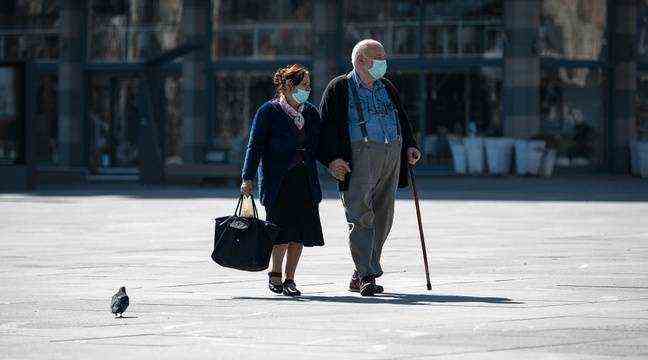A masked elderly couple (illustrative image). – Andrej ISAKOVIC / AFP
- In a series of visuals posted to Twitter on Friday, EELV gave examples of supposed green opponents to get its own supporters to vote. One of the images, which has since been removed, featured smiling elderly people and the slogan: “Boomers are planning to vote.”
- Many personalities reacted, denouncing a discriminatory campaign against the elderly.
- Originally used to refer to the baby boom generation, those born between the end of World War II and the end of the 1960s, the term “boomers” now describes those who are reluctant to change, or even backslid.
A poster that has attracted many critics. Julien Bayou, candidate for the presidency of the Ile-de-France region and boss of EELV, unveiled on Friday a series of visuals on Twitter showing examples of supposed opponents of ecology to encourage his own supporters to vote . One of the images, which has since been removed, featured smiling elderly people and the slogan: “Boomers are planning to vote. “
Sunday, the Ile-de-France candidate recognized an “error”, qualifying this visual as “awkward and hurtful”. Despite its apologies, the environmental party has drawn the wrath of many political figures, who have denounced a form of discrimination. Why is the term “boomer” so controversial?
One word, many definitions
First question, and which is not necessarily the simplest: what exactly does the term “boomer” refer to? According to the basic definition, the “boomers” are the children of the “baby boom”, that is to say the people born between the end of the Second World War and the end of the 1960s, who therefore have today. hui between 55 and 75 years old. But its meaning has changed in recent years. It is a video posted on the social network TikTok which revealed the expression “OK Boomer”. We see an elderly man declaring that “millennials and Generation Z have Peter Pan syndrome, refuse to grow up and think that the utopian ideals that rocked their youth will somehow come true in their youth. adulthood “.
The expression became even more popular at the end of 2019 when it was used by a 25-year-old New Zealand environmentalist, Chloë Swarbrick, mocked by a colleague about her age during a speech in Parliament. “We borrowed this term from the English language. Initially, it refers to a generation, people born after World War II. From now on, it designates more a state of mind, those which are not in agreement with more recent, more innovative ideas, which do not want to make things happen, ”explains Auphélie Ferreira, doctoral student and linguistics teacher at the university. Sorbonne-Nouvelle.
Agism and preconceived ideas, hello
If its meaning has changed slightly, the term “boomer” nevertheless remains associated with a category of the population, the oldest, leading to a certain stigmatization, according to Jean-François Amadieu, a sociologist specializing in discrimination. For the researcher, the fact of designating someone as being related to their age poses a problem: “This term gives a stereotypical view of baby boomers. Old people are associated with outdated, retrograde ideas and negative characteristics. Conversely, we associate youth with something positive, dynamic, ”analyzes Jean-François Amadieu. “We use this term to devalue older people over younger people, it’s a form of discrimination, of ageism,” he adds.
So aren’t all seniors “boomers”? Not necessarily, according to Auphélie Ferreira, who evokes an evolution of meaning depending on the context. “Like the majority of other words in the French language, this term has two superimposed meanings, it evolves according to the context in which it is used. “” An 80-year-old is a boomer, in the sense that it was born after World War II. But if we understand this term in its new sense, there are old people in the air, who take part in current debates. It is not because a person is 80 years old that he cannot be modern ”, deciphers the linguist.
For Jean-François Amadieu, this association of ideas is very often widespread without necessarily being justified: “In the field of employment, the question of age is dramatic. We consider that seniors are not bankable, that they cannot be creative, that they will not know how to sell to the customer. In reality, this is wrong. There is nothing to prove that seniors are not innovative, ”he says.
The hatchet between the generations soon to be buried?
The expression “boomer” in its new meaning would also (and perhaps above all) reveal an opposition between the generations: “We consider that boomers are part of a privileged generation, which has experienced years of growth, which has been able to buy goods, which has built up a wealth, which has not experienced unemployment, ”says the sociologist. If the generation of boomers enjoyed “a good quality of life”, the younger generation has to deal with rising unemployment or accelerating climate change.
And for a part of the young generation, in particular that which militates for the climate, the generation of “boomers” would have a share of responsibility in the global warming. “They are accused of having made bad choices in terms of ecology. It is a generation which has bad press, it is held responsible, but it is an unfair accusation, the seniors do not have personal responsibility neither in climate change, nor in unemployment or the quality of life ”, estimates Jean-François Amadieu.
If seniors were often associated with backward ideas or some opposition to change, the trend could be reversed. “This brutal ageism is being overcome,” says the sociologist, taking the example of the success of Bernie Sanders or Joe Biden in the United States with younger generations. “There is a shift. One would have thought that Justin Trudeau or Emmanuel Macron would be new models, but the North American example shows that it is not that simple ”.

